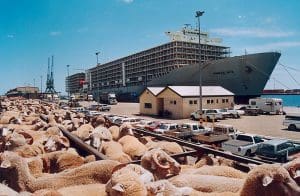 LIVESTOCK transporters today supported calls by Australian farmers and exporters to urgently improve animal welfare standards, monitoring, reporting and penalties applicable to live exports.
LIVESTOCK transporters today supported calls by Australian farmers and exporters to urgently improve animal welfare standards, monitoring, reporting and penalties applicable to live exports.
President of the Australian Livestock and Rural Transporters Association, John Beer, said the footage shown on 60 minutes last month demonstrated that current practices, monitoring, reporting and penalties applicable to live export vessels are not always delivering the animal welfare standards expected by the community and the livestock supply chain.
“We should not back away from this problem and leave it to other countries to resolve.
“Australia must identify the root cause of the issue and lead the way by putting the right type of oversight in place as soon as possible,” Mr Beer said.
The association also backed moves by the Federal Minister for Agriculture, David Littleproud, to instigate a comprehensive review of the capabilities, investigative capacity and culture of the Australian independent regulator for live exports and the establishment of a whistle-blower hotline.
Mr Beer said Australian livestock carriers lead the world in protecting the welfare of live animals during road transport and there is no reason why international shippers shouldn’t be held to equally high standards.
“Caring for live cargoes is a necessary part of the rural road transport task that is under constant scrutiny by markets, governments and the community,” said Mr Beer.
He said as a first world nation with modern values and an enforceable rule of law, it is important for Australia to play a leading role in improving live export standards.
“Over 130 countries around the world export livestock, but in establishing the Australian Standards for the Export of Livestock and requiring that all exported animals be slaughtered in approved premises, Australia has gone further than any other nation to protect animal welfare.
“Asian and Middle Eastern markets simply cannot afford to substitute live imports with chilled boxed meat, nor does Australia have the capacity to supply it,” he said.
“We already have some of the world’s best live exporters operating in Australia, so rather than surrendering the live export trade to less regulated competitors, we must take a hard look at this incident and do what is necessary to lift our standards further.
“Other nations rely on Australia to supply food to their growing populations and our domestic livestock supply chain benefits from international trade.”
Mr Beer said domestically, Australian livestock carriers are subject to legislated Land Transport Standards.
“Even so, our National Animal Welfare Committee has scrutinised our role in the supply chain and championed several important animal welfare initiatives.”
These initiatives included national guidelines for the safe design of ramps and forcing yards, working with regulators to establish more flexible driving hours to deal with in-transit animal welfare risks, merging its truckCare animal welfare accreditation system with the award-winning truckSafe system, developing a national effluent control strategy and establishing LivestockASSIST – a 24hr national hotline dedicated to coordinating emergency responses.
“Our association now has a holistic approach to promoting positive animal welfare outcomes that commences with pre-transit livestock preparation, through loading, transport, unloading and emergency responses in the rare event that things go wrong.”

It is time to stop pretending that sending live animals on overcrowded ships and to countries that allow inhumane handling and slaughter is ever going to be acceptable to Australians. They have to be crammed in to be viable and there is masses of evidence that we cannot keep these animals within approved supply chains. Live export is unavoidably inhumane. Our community’s threshold for tolerating animal cruelty and suffering in the name of economics has well and truly been crossed by this industry for decades. You cannot ship live animals halfway around the world and pretend that they do not suffer and suffer in the most sickening ways imaginable. It never was acceptable and it never will be. Please stop pretending it can ever be and get on with the more crucial job of transitioning to the boxed meat trade. Even the AVA knows it can’t be done without animals suffering. So start off with stopping these summer sheep exports May to October when you know, everyone knows, it is barbarically cruel. Enough of the crocodile tears and feigned shock and horror – get on with it.
Bahrain now imports only chilled and boxed meat from Australia. And all the countries Australia exports to in the Middle East take more of our boxed and chilled meat. Australia is the only country to undertake long-haul live export of sheep to the far-away Middle East. Live export companies have been given plenty of opportunities to lift their game, but they are so busy out-competing each other, the animal welfare is atrociously cruel. It is time to phase it out; the sooner the better.